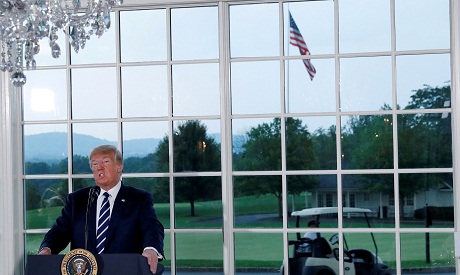
File Photo: U.S. President Donald Trump speaks at a dinner with business leaders at Trump National Golf Club in Bedminster, New Jersey, U.S., August 7, 2018 (Photo: Reuters)
U.S. President Donald Trump's administration set a goal on Thursday of creating a sixth branch of the U.S. military by 2020 known as the "Space Force" and said it would work to build bipartisan support in Congress for the plan.
Critics view the creation of a Space Force as an unnecessary and expensive bureaucratic endeavor and scoff at comparisons to the foundation of the Air Force in 1947.
U.S. Vice President Mike Pence, in a Pentagon address, described the creation of the Space Force as "an idea whose time has come." Trump, the champion of the plan, tweeted: "Space Force all the way!"
"Ultimately, Congress must act to establish this new department, which will organize, train and equip the United States Space Force," Pence said.
Pence's remarks was timed to coincide with the release of a Pentagon report outlining the steps needed to create a Space Force, something it does not have the power to do on its own.
The Pentagon report, however, included a plan to create a unified combatant command, known as the U.S. Space Command, by the end of 2018, according to a copy reviewed by Reuters. U.S. Defense Secretary Jim Mattis threw his support behind that idea on Tuesday.
The Pentagon report, however, recommended that the unified command be in the hands of the Air Force for now. The Air Force currently oversees some of the most critical space-based capabilities.
"Initially the Department will recommend that the Air Force Space Command commander be dual-hatted as commander of the unified command," the report said.
One of the arguments in favor of devoting more resources to a Space Force or Space Command is that American rivals like Russia and China appear increasingly ready to strike U.S. space-based capabilities in the event of a conflict.
"It is becoming a contested war fighting domain and we have to adapt to that reality," Mattis said as he introduced Pence.
Mattis once voiced opposition to creating a new branch of the U.S. military to focus on space-based military assets, saying in a 2017 letter to a lawmaker that would likely "present a narrower and even parochial approach to space operations."
The United States is a member of the 1967 Outer Space Treaty, which bars the stationing of weapons of mass destruction in space and only allows for the use of the moon and other celestial bodies for peaceful purposes.
Former astronaut and retired U.S. Navy Captain Mark Kelly on Thursday said a separate military branch devoted to space was redundant and wasteful, and that while Pence was right about the threats in outer space, the military was already handling them.
"There is a threat out there but it's being handled by the U.S. Air Force today. (It) doesn't make sense to build a whole other level of bureaucracy in an incredibly bureaucratic DoD," Kelly told MSNBC in an interview.
"It is an area where we should continue focus on," he added, pointing in particular to China. "But we can do this within the U.S. Air Force.
Short link: